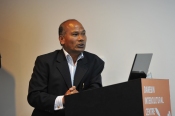
Reuters / Sage Center for the Study of the Mind, University of California, Santa Barbara / Handout
A question has plagued scientists for years: When it comes to intelligence, what distinguishes the brains of exceptionally smart humans from the rest? New research reveals that a brain scan could offer an answer.
The brain’s mass and the size of its prefrontal cortex – a region just behind the forehead – have long been believed to play a role in intelligence. New research published in the St. Louis-based Washington University Journal of Neuroscience suggests that up to ten percent of individual differences in intelligence lie in the strength of neural pathways between the brain and the left prefrontal cortex – the region linked to personality and cognitive behaviors.
In other words, the better and more efficient the neural pathways are, the more intelligent the person is. It is a new approach for understanding human intelligence, dubbed “global brain connectivity.”
This marks the first example of solid evidence that neural connections between the left prefrontal cortex and the rest of the brain are a powerful contributing factor to human intelligence, said the study’s lead author Michael W. Cole, PhD, a postdoctoral research fellow in cognitive neuroscience at Washington University. Read the rest of this entry »


















































